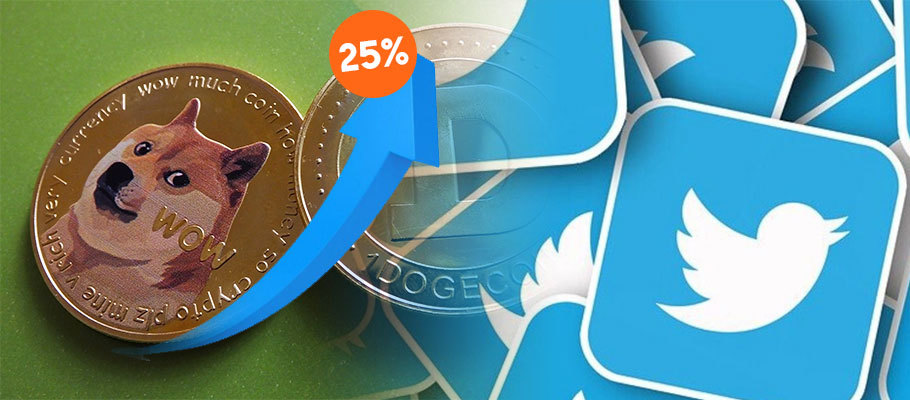
Published: April 27th, 2022
Twitter is now owned by one of crypto’s biggest boosters and noted Dogecoin fan Elon Musk.
DOGE is surging on the news. At time of writing, it was up by 25 per cent for a peak of around USD 0.1673 in the immediate aftermath of the takeover announcement. Leaders Bitcoin and Ethereum fared less well. They were only up 1.5 per cent and 1.9 per cent, respectively, on the day.
Dogecoin’s price has moved in time with many of Musk’s crypto-related Twitter proclamations. His frequent memes are credited with handing DOGE a third-place ranking by market cap for all cryptocurrencies in 2021, achieving a high of USD 0.73 at one point.
Musk assuming control of the popular social media platform has generated a wave of excitement across the crypto-sphere, including an outburst from Dogecoin founder William Marcus. ‘Can Mr. Musk please purchase the SEC now?’ he tweeted rhetorically, naming & shaming the regulator for dragging its feet on approving a spot exchange traded fund (ETF) for Bitcoin.
Michael Saylor, CEO of MicroStrategy and one of the world’s biggest Bitcoin whales, offered Musk congratulations via Twitter, quoting the American Constitution’s first amendment, which guarantees that governments can't place limits on free speech.
Musk’s move to purchase the notoriously profit-less tech company appears to be driven, at least in part, by Musk’s pro-free speech beliefs and perceptions that Twitter is a vital medium for shaping US public opinion. In an announcement he praised Twitter’s potential as a ‘platform for promoting free speech around the planet’, but also said he didn't believe it would be realised if the platform continued as a publicly-traded company.
In addition to taking Twitter private, Musk is also promising to ‘battle the spam bots’ that clog-up social feeds for millions of users. ‘Twitter has incredible potential,’ Musk said. ‘I’m excited about working with the company and its community of users to unleash it.’
MicroStrategy's Saylor has proposed in the past addressing Twitter's spam problem by using the Bitcoin Lightning Network. In his scenario Twitter users would be allowed to load accounts with a given number of satoshis (the smallest Bitcoin unit) and gain an orange authenticity checkmark for their accounts. That would allow actual human Twitter users to be identified and sidestep the onerous know-your-customer (KYC) procedures currently needed to obtain a coveted ‘blue tick’ of authenticity.
Twitter’s builders have already created an underlying infrastructure to support payments via Bitcoin and Ethereum. Many now believe Dogecoin functionality will soon follow now that Musk is in charge.
After weeks of public resistance, Twitter’s board decided on Monday, 25th April, to accept the Tesla and SpaceX CEO’s USD 44 billion bid to buy the social media platform.
The week before it was actively resisting Musk’s advances, with talk of poison pill measures to make a takeover less palatable and suggestions another ‘white knight’ might swoop and in nullify the move.
In the end, the board quickly abandoned those ideas and said yes to an offer of USD $54.19 per share for Twitter’s shareholders. According to a company press release, Musk's offer is a 38 per cent lift on the closing share price registered on April 1, the day before Musk announced he had taken a 10 per cent position in the company.
On Monday the company’s share price stood at USD 50.65 at the start of Monday and was up to USD 52.00 by mid-day. At time of writing it stands at USD 50.26.
Musk, tech billionaire and one of the world’s wealthiest individuals, originally planned to become the social network's largest individual shareholder, guaranteeing him a place on Twitters board. Then then he changed tack, revealing plans to buy Twitter outright and take the business private.
He’s since said that he wants to build in an "edit" button for tweets and to stop spambots and crypto scams that use the network to pump up prices based on artificially-generated ‘buzz’ around a given coin. Musk is a well-known Dogecoin booster and has also mooted the possibility of accepting DOGE as payment for Twitter's premium subscription service.
Dogecoin began life as a joke, playing on the mix of fear and hyper-enthusiasm that followed Bitcoin when it first gained fame.
DOGE spent most of its life largely un-noticed and worth less than a penny (US). Then in May of 2021 Tesla CEO Elon Musk and Dallas Mavericks owner Mark Cuban started promoting DOGE for its transactional capabilities. That moved the price past USD 0.73, prompting leading exchanges Coinbase and LocalBitcoins to start trading it.
Capitalising on its newfound popularity, the exchanges adding it to their respective lists of trade-able digital assets. The price of DOGE naturally went up, posting gains of between 5 and 7 per cent on news of the listings. Dogecoin has moved steadily up the charts ever since, becoming the seventh-biggest cryptocurrency at one stage last year with a market cap of USD 43.6 billion.
Other exchanges have since added it to their rosters, however DOGE still gets most of its trading traction from the Robinhood mobile app, where it's one of just a few crypto assets the firm lists.
The moves by Coinbase and LocalBitcoins gave DOGE new legitimacy, placing the meme-inspired coin on a clear path to mainstream adoption.
While memes have humorous intent, in an age of digital and often-visual discourse, they can shape conversations and mold collective ideas. Memes can now move markets, and Dogecoin is a perfect example.
Its founders used a popular meme that used an of a Japanese Shiba Inu hunting dog with raised eyebrows. It’s been so successful that DOGE has actually inspired new meme coins like Shiba Inu (SHIB) and Akita Inu (AKITA). In both cases the goals seems to be simply to make risky financial instruments more fun.